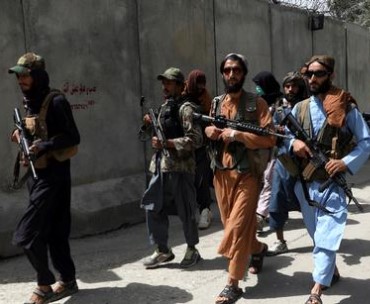
The foto has taken from www.dw.com
STRATEGIC ASSESSMENT. The Taliban claimed to have successfully conquered the last holdouts against its control in the Panjshir Valley, historically a stronghold of opposition to invaders and home to staunch opponents of the Taliban. The rugged valley, which extends as far south as 50 miles from Kabul, is the base of the self-declared “National Resistance Front,” a revival of the former “Northern Alliance” multi-ethnic grouping that fought against the Taliban during the 1990s. The Front is led by officials of the ousted U.S.-backed government and leaders and families of the Northern Alliance.
As was the Northern Alliance, the Front is dominated by Persian-speaking ethnic Tajiks who have long opposed not only the Pashtun-dominated Taliban, but also have been wary partners and political competitors of other Pashtun leaders, including former presidents Hamid Karzai and Ashraf Ghani. The Northern Alliance had outside support due to its juxtaposition to the Taliban regime, which hosted Osama bin Laden and his Al Qaeda organization. Notably, al-Qaeda assassinated the Alliance’s legendary military commander, Ahmad Shah Massoud, two days before the September 11, 2001 attacks on the United States. In its current iteration, the Alliance’s leaders are the first Vice President of the ousted government, Amrollah Saleh, and Massoud’s 32-year-old UK-educated son, Ahmad. The younger Massoud claims, despite a lack of prior military experience, that he can fill his father’s shoes as a clever and successful opposition military commander.
The National Resistance Front is resisting Taliban control because Afghanistan’s new rulers refuse to grant the Panjshir substantial local autonomy. Talks between the Front and the Taliban broke down in late August, and the Taliban subsequently surrounded the province with reinforcements. On September 6, the Taliban claimed control of the province’s capital, Bazarak; however, the opposition claims it continues to hold “strategic positions” throughout the province and will continue to fight Taliban forces. Yet, the Taliban has substantial battle experience, and the Panjshir-based opposition has no resupply routes through Taliban-controlled border crossings to Tajikistan and no evident outside support. Moreover, some of the leaders of the former Northern Alliance, including Dr. Abdullah Abdullah, a senior leader in both Karzai’s and Ghani’s governments, are in talks with the Taliban on forming a broad-based government in Kabul.
The Taliban announced the formation of its government yesterday, rewarding Siraj Haqqani and other wanted terrorists with top ministerial posts. Some expect guerrilla activity in Panjshir—and possibly elsewhere throughout Afghanistan—to persist indefinitely. Referring to the likelihood of anti-Taliban insurgency, Chairman of the Joint Chiefs of Staff Gen. Mark Milley told journalists in early September: “My military estimate is that the conditions are likely to develop of a civil war. I don’t know if the Taliban is gonna be able to consolidate power and establish governance—they may be, maybe not.”
If the Taliban replicates the behavior it exhibited during its 1996-2001 rule, the political and military prospects for opposition groups, including the National Resistance Front, will improve. Repression of Afghanistan’s Tajik, Uzbek, and Hazara communities will undoubtedly spark unrest in the north, west, and center of Afghanistan that these minorities inhabit. Insurgent militias dominated by members of these minorities could reactivate and align with the National Resistance Front, just as these communities allied with the Northern Alliance in the 1990s. Insurgent groups might gain strength if Taliban repression of women’s rights causes demonstrations and unrest that compel the Taliban to spread out its security forces. The Taliban has already forcefully repressed several demonstrations by women asserting their rights in a Taliban-government Afghanistan. Afghan figures that have, for now, aligned themselves with the Taliban might defect to opposition groups if public unrest against the Taliban builds.
Taliban human rights abuses will engender significant global criticism, but it is evidence of Taliban toleration of al-Qaeda and other global jihadist organizations that would prompt major international players to actively support the Taliban’s opposition. Those most likely to provide that support are the erstwhile Northern Alliance backers—the United States, India, and Iran. A renewed alliance with al-Qaeda and a refusal to combat Islamic State Khorasan Province (IS-K) would violate the February 2020 U.S.-Taliban “Doha Agreement” and signal that Afghanistan is once again becoming a base for plots against the U.S. homeland. If global jihadist groups are again able to congregate in Afghanistan, the Biden administration would be compelled to act against the Taliban. Military support for anti-Taliban oppositionists would exert greater pressure on the group than would sanctions or diplomatic pressure. Recognizing that an elevated terrorism threat is a potent tool for attracting international support to the Alliance’s cause, Ahmad Massoud’s August 18 editorial in the Washington Post stressed that threat by stating: “Under Taliban control, Afghanistan will without doubt become ground zero of radical Islamist terrorism; plots against democracies will be hatched here once again.”





